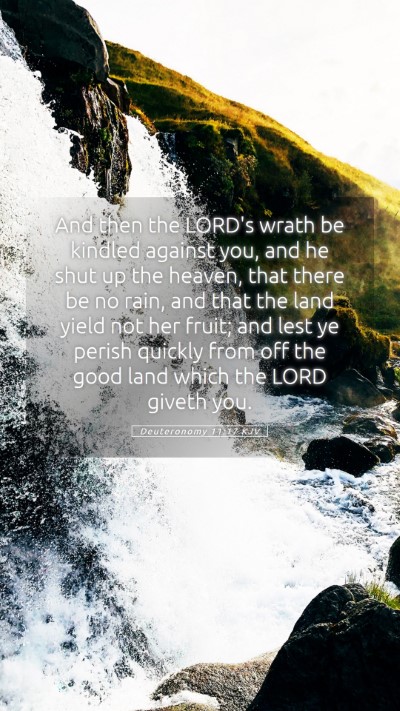Bible Verse Meaning of Deuteronomy 11:17
Deuteronomy 11:17 states: "And then the anger of the Lord will be kindled against you, and he will shut up the heaven, that there be no rain, and that the land yield not her fruit; and lest ye perish quickly from off the good land which the Lord giveth you."
Overview of the Verse
This verse serves as a warning to the Israelites about the consequences of disobedience to God's commands. Matthew Henry, Albert Barnes, and Adam Clarke each provide insights into the gravity of turning away from God and how it affects not only the individual but the community as a whole.
Understanding the Meaning
- Divine Anger: The phrase "anger of the Lord" signifies the seriousness of God's response to sin. It emphasizes His righteous indignation when His commandments are not upheld.
- Consequences of Disobedience: The verse illustrates a cause-and-effect relationship; disobedience leads to tangible repercussions, such as drought and famine.
- Significance of Rain: Rain in biblical times was essential for agriculture, representing God’s blessing and provision. A lack of rain symbolizes withdrawal of these blessings, pointing to spiritual barrenness.
- Land as a Gift: The reference to the "good land" serves as a reminder of God's promises and faithfulness. It highlights that the Israelites are tenants and must honor their part of the covenant.
- Urgency of Obedience: The warning against quick destruction signifies the immediacy with which the Israelites must respond to God’s commands. Their survival and prosperity depend on their adherence to His laws.
Bible Verse Commentary
According to Matthew Henry's Commentary, this verse is a reminder that God is not indifferent to our actions. The refusal to listen leads to divine judgment and reminds us that the goodness of our land is contingent upon our faithfulness. Albert Barnes expands on this by stressing that Israel's temporal well-being was directly linked to their spiritual obedience.
Adam Clarke highlights the metaphorical implications of "shutting up heaven" as God's way of communicating His displeasure. It serves as a call to genuine repentance and reflection on their obedience to divine law.
Application to Daily Life
This verse holds significant relevance today. Understanding the consequences of our actions and the importance of faithfulness to God can guide us in maintaining a healthy relationship with Him. Here are some applications:
- Engaging in Bible study groups to foster community and mutual accountability.
- Implementing Bible study tools to deepen understanding of Scriptural commands.
- Regular prayer and repentance to invoke God’s blessings in daily life.
- Recognizing areas in life where we may stray from obedience and actively working to correct those paths.
Cross References
- Deuteronomy 28:23 - Discusses similar themes of blessings and curses based on obedience and disobedience.
- 2 Chronicles 7:13-14 - God’s promise to respond to repentance and prayer.
- James 4:6 - Emphasizes God's opposition to the proud while giving grace to the humble.
Conclusion
In conclusion, Deuteronomy 11:17 is a sober reminder of the importance of obedience to God’s law. Through careful analysis and interpretation, we can understand its implications for both the ancient Israelites and modern believers. Engaging in discussions about Bible verse meanings and applying these insights can help deepen our Bible verse understanding and Bible study insights.


